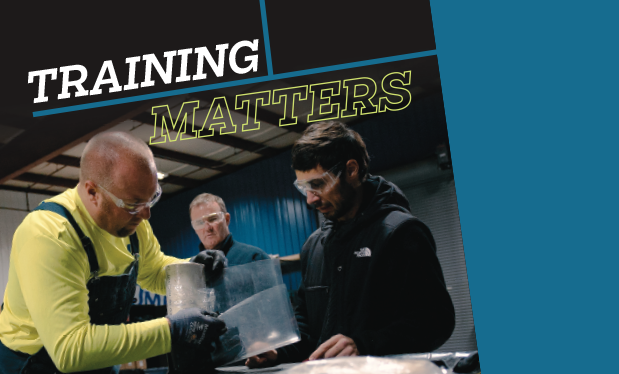The past year has been an important one for NRCA as the association rolled out two major initiatives aimed at improving the industry’s image and workforce: NRCA ProCertification™ and NRCA’s Qualified Trainer program. (To read more about NRCA ProCertification, see “Certifying the industry,” February 2019 issue.)
Both were borne from the idea that to draw more employees into the industry, the industry must offer clear career paths and proper training and education. A qualified trainer is someone recognized as being trained to be a trainer, and an NRCA Qualified Trainer is someone who has been trained by NRCA specifically to be an effective trainer in the roofing industry.
Training trainers
Training a trainer is important work. Simply explaining to someone how to do a particular task and sending him or her out with a crew is not a thoughtful approach to training. Demonstrating a task or skill to a new employee once or twice while on a job also is not effective on-the-job training. However, this type of training takes place at many roofing companies and often leaves management and foremen surprised when employees do not perform as expected.
Everyone bears the brunt of ineffective training: Foremen, who are expected to simultaneously meet deadlines and quality standards while training unskilled laborers; new employees who are shamed by more experienced and impatient crewmates; and companies when quality, timelines and employee satisfaction suffer. The overall negative effect on employee morale cannot be overstated. It takes the form of, among other things, production problems, exasperated foremen and new employees who stop showing up after a few days, weeks or months.
Do you offer effective training?
If your company executes effective installation training, you can see the signs. People work efficiently and feel good about what they’re contributing to their crews. And they expect to receive training. If you’re not sure whether this is a strength of your company, ask some of your installers—especially new installers. A few years ago, NRCA surveyed field employees, and about half of them reported orientations at their companies and jobs were short or nonexistent. Most people do not thrive when thrown into doing work they don’t understand, especially in high-production, high-pressure environments where peers are easily frustrated with team members who don’t know what they’re doing.
But many contractors, not wanting to waste money, wait to see whether employees will stick around for a few months before investing in training them. With the ability to train people right away, more employees will stay because they’re being trained rather than leaving before being trained. If the goal is for a new employee to be productive as soon as possible, the best opportunity for training is the day he or she starts.
Effective roof system installation training is an intentional, well-paced plan of instruction, demonstration, coaching and practice. No one drifts into providing quality training; it’s not something that happens without significant intention. An NRCA Qualified Trainer is trained to facilitate this intentional, effective training for roof system installers. Let’s take a quick look at each element of effective training.
Instruction
Instruction helps installers understand the scope of their work. Rather than focusing only on a discrete skill of, for instance, driving fasteners through rigid board insulation, instruction explains what insulation is, why it’s installed between a vapor retarder and a membrane, what a cover board is, what R-value means, why fasteners have plates and other relevant concerns. Entry-level workers do not require—or want—too much information, but some instruction helps installers care about doing their jobs well.
NRCA Qualified Trainers understand the purpose of instruction as part of their training plans and know to make time for it. In a rush to turn people into productive installers, instruction is a commonly overlooked segment. Foremen, or anyone training on an active job site, rarely have time to step back and address this topic. But when trainers take time to instruct, efficiencies are realized later when participants are able to assess for themselves the implications of various types of installation errors.
Demonstration
Demonstration is something most roof system installers do quite well; however, there is a difference between simple demonstration and demonstrating a skill with the intent to train. Unless it’s slow and intentional and the next step of a demonstration is to hand over the tools and give a worker a chance to try his or her hand at the skill, there’s really no difference between watching a person demonstrate a skill live and watching a video. The observer will remember some of what he or she witnessed but not necessarily be able to do anything different than he or she could before the demonstration.
NRCA Qualified Trainers appreciate the critical reasons for involving people in their learning.
Coaching
Mention coaching, and most of us think of sports, which is appropriate. A coach teaches; observes; considers what a player is doing well and encourages more of that behavior; notices skills that need improvement and works with the player to strengthen those skills; asks players how they feel about their own performances; and, ultimately, after many hours of practice, strategically empowers players but does not step in to do their jobs for them. The coach’s goal is to build competency in players so the players are able to succeed.
Coaching as a teaching style is the best way to build retention in learners and is an underdeveloped training style in the roofing industry. For these reasons, it is one of the main focuses of the NRCA Qualified Trainer curricula. When trainers see the value of coaching, they want to become effective coaches and often request more time to practice this skill.
When a majority of roofing companies employ individuals who possess excellent training skills and these trainers are empowered to train their companies’ workforces, especially new employees, the roofing industry’s culture of training will reach new levels of effectiveness. Instead of hit-or-miss orientations occurring before thrusting inexperienced, ill-equipped individuals onto job sites, intentional training sessions will provide employees with language, concepts and basic skills they will be able to leverage into flourishing careers.
Trainers need to know what they’re doing to create this kind of change and NRCA Qualified Trainers, with the authority of their companies’ leadership, will be perfectly poised to enact this culture shift.
Practice
Finally, people need to practice new skills to become proficient. An active job site is a poor place to practice new skills because mistakes are costly in terms of time, resources and confidence. Time, space and materials to practice on mockups are critical and only truly productive when a trainer is nearby to provide instruction, demonstration and coaching.
A huge benefit
When these steps are part of new employee training, employees will gain confidence and be effective in the field sooner—a big win for your company and new hires alike.
Jared Ribble is director of NRCA's Qualified Trainer and ProCertification programs, and Amy Staska is vice president of NRCA University.
Qualified Trainer Conference
NRCA began offering its Qualified Trainer Conference in 2017 in the Chicago area at a Johns Manville training facility. In 2018, the Florida Roofing and Sheet Metal Contractors Association hosted a conference at its training facility, and that conference filled to capacity. Several conferences later, more than 100 individuals from roofing companies, manufacturers, distributors and local roofing associations have become NRCA Qualified Trainers. Before the end of 2019, NRCA plans to hold 12 conferences in various cities throughout the U.S. during the fall and winter seasons.
During a conference, every moment is calculated to create an environment in which participants gain practical experience with their training skills. They receive instruction, see demonstrations, are coached and practice—exactly as they strive to do with their trainees.
Participants engage in experiences designed to help them relax, practice and focus on becoming excellent trainers. Participants who successfully complete the program earn recognition and NRCA Qualified Trainer digital badges.
It is important to note NRCA Qualified Trainers are designed to train workers enrolled in NRCA’s Training for Roof Application Careers program, which is a combination of online education and hands-on activities for inexperienced field employees. The goal of TRAC is “conversational competence,” or the ability to interact with foremen and other crew members with confidence so new employees can readily learn by observing, be productive and ask intelligent questions. During NRCA’s Qualified Trainer Conference, participants are introduced to the TRAC content, which soon will be released in English and Spanish.
To learn more about Qualified Trainer Conferences, go to www.nrca.net/Qualified-Trainer.
For an article related to this topic, see "Elevating professionalism," December 2013 issue.



